| Srl | Item |
| 1 |
ID:
106313
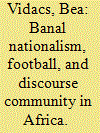

|
|
|
|
|
| Publication |
2011.
|
| Summary/Abstract |
The article argues that despite the continuing relevance of ethnicity, the idea of the nation has taken root among Africans. This is due to a combination of factors, including the universal ideology of the nation-state, the impact of the existence of such national borders on the imagination, and the influence of national symbols and icons, which naturalise the idea of the nation. Applying Michael Billig's notion of banal nationalism to Cameroon, the article focuses on linguistic practices as well as on popular appropriations of national symbols as contributing factors to the creation and maintenance of national consciousness. The analysis of a call-in radio program broadcast on Cameroonian national radio during the 1994 FIFA World Cup illustrates that football created a discourse community that reinforced the idea of the nation both explicitly and implicitly. By participating in the debate, journalists and listeners alike - regardless of the tenor of their remarks - reinforced and further contributed to imagining the Cameroonian nation.
|
|
|
|
|
|
|
|
|
|
|
|
|
|
|
|
| 2 |
ID:
106314
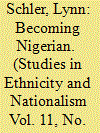

|
|
|
|
|
| Publication |
2011.
|
| Summary/Abstract |
This article examines the process of nationalisation in the lives of African seamen in the era of decolonisation in order to understand why some Africans were drawn to nationalist identities at this time, and what they hoped to gain from this identification. It will be seen that in becoming Nigerian, seamen had to forfeit transnational sources of solidarity, and ultimately had to contend with new forms of exclusion and discrimination based on ethnicity and class within the Nigerian national context. The study thus follows the journey of everyday Africans as they sought out and engaged with ideological and political opportunities on the eve of independence, and the consequences of their aspirations and choices.
|
|
|
|
|
|
|
|
|
|
|
|
|
|
|
|
| 3 |
ID:
106315
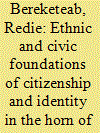

|
|
|
|
|
| Publication |
2011.
|
| Summary/Abstract |
The article seeks to analyse the ethic and civic forms of citizenship and identity in the Horn of Africa. Ethiopia and to some extent Sudan are pursuing the ethnic model. While Eritrea and Djibouti pursue the civic model, Somalia represents a special case. Ethnic citizenship may guarantee equal rights, self-rule, and self-fulfilment; however, it could also be a cause of division and irredentism. Civic citizenship could create unity and cohesion in polyethnic societies; it could also lead to majority domination. The article contends that both models are relevant where the national level could be served by the civic model and the sub-national is served by the ethnic model. The article concludes that the politics of domination are the main obstacle to the equal rights of citizens, and therefore politics of domination should be replaced by the politics of rights.
|
|
|
|
|
|
|
|
|
|
|
|
|
|
|
|
| 4 |
ID:
106316
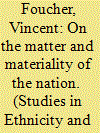

|
|
|
|
|
| Publication |
2011.
|
| Summary/Abstract |
To understand both the persistence and the very low intensity of the ongoing Casamançais separatist conflict in southern Senegal, one has to take into account the longer history of the encounter between the Senegalese state and the community that the separatists claim to represent. This is not the history of an estrangement, but quite to the contrary, a history of a strong connection, one where 'pilgrimages' of education and state employment have played a key role. It is the intensity of the connection that explains both the vivacity of the sentiment that feeds separatism and the reluctance of many Casamançais to break these links entirely. The state's success in maintaining and even revamping this connection, and the fact that many Casamançais enjoy a working relationship with Senegal and its capital city, Dakar, have been key factors. This case confirms that the materiality of experiences of nationhood matters. It also confirms the importance of education in the formation (and contestation) of nationhood.
|
|
|
|
|
|
|
|
|
|
|
|
|
|
|
|
| 5 |
ID:
106311
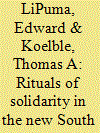

|
|
|
|
|
| Publication |
2011.
|
| Summary/Abstract |
There is a deep connectivity between the construction of peoplehood and the fabrication of rituals, especially national secular rites of commemoration. The article examines this connection through an analysis of the process of ritualisation in post-apartheid South Africa focusing on Nelson Mandela's incarceration on Robben Island and subsequent efforts to create a memorial to both person and place.
|
|
|
|
|
|
|
|
|
|
|
|
|
|
|
|